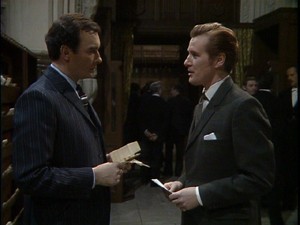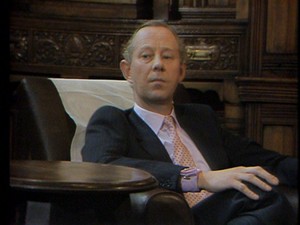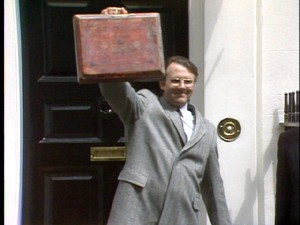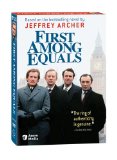| Reviews & Columns |
|
Reviews DVD TV on DVD Blu-ray 4K UHD International DVDs In Theaters Reviews by Studio Video Games Features Collector Series DVDs Easter Egg Database Interviews DVD Talk Radio Feature Articles Columns Anime Talk DVD Savant Horror DVDs The M.O.D. Squad Art House HD Talk Silent DVD
|
DVD Talk Forum |
|
|
| Resources |
|
DVD Price Search Customer Service #'s RCE Info Links |
|
Columns
|
|
|
First Among Equals
Acorn Media // Unrated // September 16, 2008
List Price: $49.99 [Buy now and save at Amazon]
 Ambition, scandal, and betrayal abound in the 1986 ITV adaptation of Jeffrey Archer's novel "First Among Equals," which mixes the density of British politics and the over-the-top-ness of melodrama with great verve. Every chapter focusing on real-life parliamentary struggles is matched by one relishing in adultery, heartbreak, and ruin - it's as wonky as a soap opera can possibly get, a sort of "West Wing" by way of "Dynasty."
Ambition, scandal, and betrayal abound in the 1986 ITV adaptation of Jeffrey Archer's novel "First Among Equals," which mixes the density of British politics and the over-the-top-ness of melodrama with great verve. Every chapter focusing on real-life parliamentary struggles is matched by one relishing in adultery, heartbreak, and ruin - it's as wonky as a soap opera can possibly get, a sort of "West Wing" by way of "Dynasty."The ten-part series opens in 1964, when four rookie MPs take their first steps on the road of national politics. Simon Kerslake (James Faulkner) - a character based mainly on Archer himself, whose experiences in Parliament inspired the book - is a quietly noble centrist Conservative. His fiercest rival over the years will be a fellow Tory, the arrogant, cunning aristocrat Charles Seymour (Jeremy Child). Raymond Gould (Tom Wilkinson) will serve the Labour Party well, although his keen administrative mind hides a personal life riddled with infidelity. Scotsman Andrew Fraser (David Robb) begins his career with Labour, but his troubles within the party would only be surpassed by hardships at home. The series spans from the mid-1960s through what was then the speculative future of a post-Thatcher 1991, and over those years, we watch these four men rise and fall and rise again.
American viewers may find themselves (as I did) often lost in the haze of offices, laws, procedures, and other complexities native to Westminster; considering the original target audience, there's no reason to explain the internal workings of Parliament to viewers. (Fans of Archer should note that the series is faithful to the original UK version of the novel, and not the US version, which altered characters, added a primer on British government, and, most notably, changed the ending. One notable exception is that the script exchanges Archer's use of real-life politicians for thinly-veiled fictional counterparts - "Henry Lindsey" filling in for Edward Heath, and so on.) Derek Marlowe's screenplay lays it on thick, which wonks will certainly appreciate, especially since the series spends so much time in a stunning recreation of the Commons chamber, the cast looking perfectly at home bickering over the finer points of lawmaking. Cramming nearly three decades of intense modern political history into ten hours (starting off about a year per episode, then really cranking up the pace later on) doesn't allow any time for a refresher course.
But while the ins and outs of decades-old Brit-specific political history left me reaching for Wikipedia from time to time, the series never lost me in its wake. Underneath all that wonky goodness lies a ripping character drama, wonderfully acted and smartly paced, building toward a deliciously tense finale that finds all four men at the culmination of their careers, one of them perhaps even becoming Prime Minister.
Much of the success lies with Archer's original story, which maps out an epic yet intimate tale of power. But from Archer's material also comes some of the series' biggest flaws, subplots and character notes that don't add up the way they should. Whenever we get corny elements like when Charles squares off with his gay hippie twin brother (also played by Child, in the series' goofiest moment) or Andrew visits his wife (Diana Hardcastle) in an asylum, we can feel the script straining too hard to tease with naughty thrills. The series' directors add to the trouble by often overemphasizing the small-screen theatrics, with the more scandalous elements getting played to the hilt for the Joan Collins crowd.
 And even when the story doesn't aim for naughtiness, it still misses the mark, as in the vital plotline in which Charles, having previously walked in on his wife in bed with another man (oh, the soapy cheese!), hooks up with a trophy wife, a slinky, brash, gold-digging model who's at home on the disco club scene, not political circles . As played here, we never quite buy Charles' reasons for marrying her - especially if, we we've been asked to believe, he's so concerned with appearances. The idea is that he's married two women as conniving and cruel as he is, just the women he deserves, yet the young party girl-as-wife idea never fully fits the picture the way it should.
And even when the story doesn't aim for naughtiness, it still misses the mark, as in the vital plotline in which Charles, having previously walked in on his wife in bed with another man (oh, the soapy cheese!), hooks up with a trophy wife, a slinky, brash, gold-digging model who's at home on the disco club scene, not political circles . As played here, we never quite buy Charles' reasons for marrying her - especially if, we we've been asked to believe, he's so concerned with appearances. The idea is that he's married two women as conniving and cruel as he is, just the women he deserves, yet the young party girl-as-wife idea never fully fits the picture the way it should.These are ultimately minor concerns, however, small bumps in the long road. It should be noted that all four leading men are superb, even when the script calls for them to plow through some ridiculous material, like that Charles' twin silliness. Such strong performances then truly shine when the script cleans up and goes for straight-on drama. These are four fully realized characters, grandly engaging in broad strokes, thoughtfully interesting through the small moments.
Consider one scene in an early episode, in which Raymond, having previously visited a prostitute, which led to a blackmail scheme against him, gets cornered by a reporter eager to uncover more on the matter. Watch how Wilkinson handles the material, and listen how the script handles Raymond. The young MP, somehow honorable despite the womanizing, manages to shoo off the reporter without ever denying the charge. He threatens the writer with allegations of slander, but never lies. Wilkinson, meanwhile, allows us to see the wheels spinning quickly in Raymond's steel trap mind while also revealing a character who is essentially quiet and shy.
It's this seeming paradox - the bold politician with the bookish, muted demeanor - that Wilkinson plays best. It also explains how the character earns our respect. Unlike Simon, who is essentially flawless (the lone scandal of his career is never his fault; he boldly sidesteps dirty politics), or Andrew, whose life is cluttered with misfortune (a heartrending loss in the family, a troubled wife, all that party in-fighting), Raymond is a man who lives fully in the gray areas of his world. He's a brilliant politician yet a subdued one, a moral man with an amoral personal life (he engages in two long-term affairs as the years progress). We root for his success, even when we're not sure he deserves it.
The other characters play as less complex "types," but to smart effect. Simon may be immaculate, but his story is still packed with fascinating drama, such as the plotline that finds him on the brink of bankruptcy; his recovery causes a later scandal for which he is not at fault. Instead of using his lack of guilt as a sign of Simon's (and this Archer's) "perfection," it's used as a great dramatic tool: how can one survive within such a scandal? Simon is trapped by circumstance.
Andrew, meanwhile, becomes the series' punching bag. He's surrounded by tragedy, the best place for Fleming and Marlowe to dump any number of dramatic and political ideas, from hardship at home to the inner workings of a complex election that ultimately relies, of course, on the whims of fate. Yet Robb does not play him as a sad sack, nor does he beg he audience for pity. His Andrew is a man who constantly rises above it, and again, he earns our cheers.
The last piece of this puzzle is Child's Charles, who makes for one hell of a villain, the kind we love to hate. We relish in the failures of his personal life, but more importantly, we enjoy watching him in action, the scheming and planning and devilish maneuvering. He's a slick operator, and like all great baddies, we come to respect him - so much so that we applaud the scene in the final episode in which, following a lifetime of service, his fellow MPs shower him with admiration. We cheer with them, and how curious, complex, and rewarding a story must be when you can say the villain gets what he deserves without meaning he "gets what he deserves."
Such intense character work makes "First Among Equals" crackle; the intricate political history is just icing for those who appreciate it. As epic drama, it works quite wonderfully, and as overblown soapy cheese, it's still thoroughly enjoyable, all building to a highly rewarding finale. Even if you're not into "West Wing"-style politics, you'll find something to captivate here.
 The DVD
The DVD"First Among Equals" arrives on Region 1 DVD in a three-disc set from Acorn Media. The three discs are housed in three slimline cases which fit into a glossy cardboard slipcover. Disc One contains the first four 50-minute episodes; Discs Two and Three feature three more episodes apiece. These episodes are the complete versions as originally broadcast on ITV.
Video & Audio
"First Among Equals" hasn't aged too well, and anyone familiar with mid-80s British television will recognize the bland look of broadcast videotape used at the time (even for outdoor scenes). Softness and grain abound, especially in nighttime scenes, and colors are muted. viewers should keep in mind that his is about as good as the series will ever look. Digital artifacts are kept to a minimum, although there is some interlacing (which isn't too noticeable) left over from the transfer from PAL to NTSC. Presented in the original 1.33:1 broadcast format.
The soundtrack is a simple Dolby stereo mix, as originally broadcast. Dialogue is front and center here, coming through cleanly and clearly, with no noticeable distortion or hiss. No subtitles are offered.
Extras
Disc One features a set of promos for other Acorn releases, which plays as the disc loads. Presented in 1.78:1 anamorphic widescreen.
Disc Three includes a text-only biography of Jeffrey Archer and "selected filmographies" for the four main actors.
Final Thoughts
Fans of British television will greatly enjoy the mix of sweeping storytelling, bold character work, and complex political history. Recommended.
|
| Popular Reviews |
| Sponsored Links |
|
|
| Sponsored Links |
|
|
| Release List | Reviews | Shop | Newsletter | Forum | DVD Giveaways | Blu-Ray | Advertise |
|
Copyright 2024 DVDTalk.com All Rights Reserved. Legal Info, Privacy Policy, Terms of Use,
Manage Preferences,
Your Privacy Choices | |||||||














